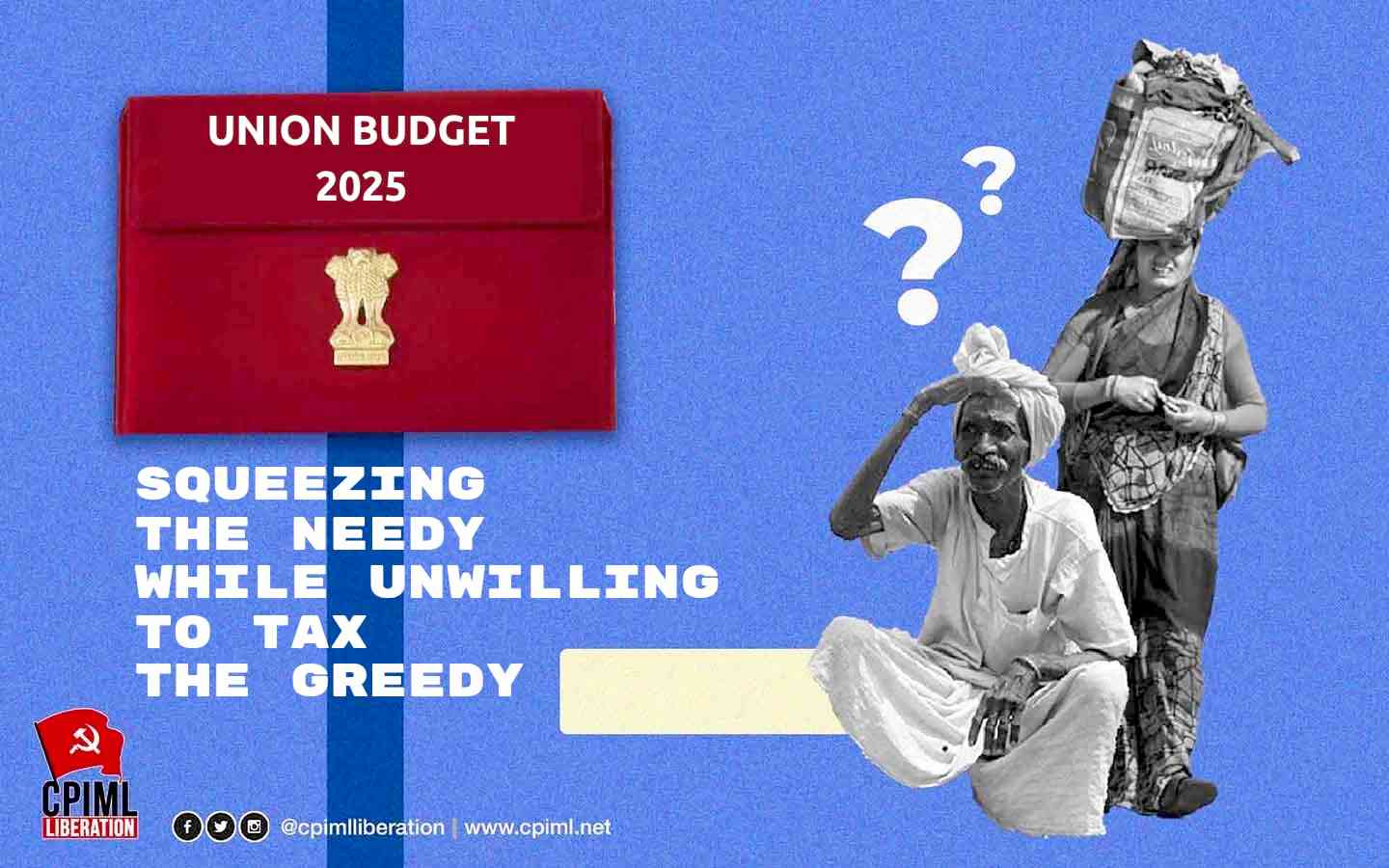Budget 2025 : Squeezing the needy while unwilling to tax the greedy

New Delhi, 1 February 2025
Finance Minister Nirmala Sitharaman presented the first full budget of the Modi 3.0 government. The backdrop to the present budget was marked by food inflation picking up, growth stagnating, job-loss mounting, rupee tumbling, consumption dwindling, farmers agitating & global uncertainties with the new Trump administration in USA making noises for protectionist economic measures that will hit exports of developing economies. It was hoped that the government would deliver a budget which would give relief to the needy by taxing greedy to curtail growing economic inequality which is hitting aggregate demand. But the government failed to course correct itself from its pro-rich image.
The actual budget belies all these presuppositions with only the middle class getting some relief in direct taxes while workers, farmers and a large section of toiling people left to struggle with no major announcements for relief either in form of cut in GST on essentials nor through welfare measures. In fact, with the government lacking the political willingness to increase taxes on corporates, rich and wealthy, the budget numbers are sought to be balanced through cutting expenditures on welfare, social, agricultural and rural sectors.
The budget estimates of past year 2024-25 on central sector schemes and centrally sponsored schemes was Rs 20,22,154 crores but the revised estimates of actual expenditure is pegged at Rs 19, 28, 176 Crores down by Rs 93,978 Crore.
The revised expenditure on flagship Pradhanmantri Awas Yojna and National Rural Drinking Water Mission for 2024-25 was staggeringly less than 50% percent of budget allocations of last year.
The budget allocations schemes like MGNREGA, Gram Sadak Yojna, scholarship for Scheduled Castes is less than expectations. Expenditure on health, women and child development etc has not increased as was needed. The budget allocation for the Department of Food and Public distribution for next year is also less.
Ministry of Skill Development and Entrepreneurship has a budget allocation of Rs 1,435 crore last year but actual expenditure made was only Rs 669 Crore.
The actual expenditure of department of health were less than last year budget proposals. The demand for the increase in the wages of Scheme workers - ASHA, Aanganwadi, Mid-day Meal workers - as well as their recognition as employees has been ignored in the budget.
The government has opened insurance sector for 100% FDI while the allocation in Pradhan Mantri Fasal Bima Yojana has been decreased from 15684 crore to 1242 crores this year. This clearly puts farmers, as well as common people, at the mercy of big corporates which is a worrying trend.
The Bihar has been demanding special status for a long time, which was also the promise made by Modi and BJP. The budget again betrays from this promise. The proposals for Makhana Board etc are quite inadequate for the state’s development.
While lot of self-praise was done last year by the government for an increase in capital expenditure in budget, the revised estimates of actual expenditure on this head is less by whopping Rs 1.84 lakh crore.
All this shows the government's misplaced priorities away from sectors which need assistance. The budget number shows that the fiscal space for govt is shrinking with about 40 percent of total overall increase in budget expenditure for FY 2025-26 being taken up by additional interest outgo on past borrowings. While the needy are squeezed further through cuts on welfare expenditure the revenue collection from tax shows that despite the big announcement of relaxation in income tax to middle classes the budgeted tax collections from GST & Income tax would continue to be higher than Corporate taxes in FY 2025-26.
The Budget 2025-26 presented today by FM Nirmala Sitharaman explicitly reveals Modi Government’s continuing mismanagement of the economy to favour its cronies and the corporate sector. The reality of continuing decline in the real wages of workers and decreasing unemployment in regular jobs has been left unaddressed along with the issue of rising prices. The post-tax profits of the corporate sector have risen more than four times, simultaneously with decrease in real wages mainly in the private sector. But this budget refuses to increase the corporate tax which has been a demand for a long time despite the corporates’ total tax component is now less than the personal income tax component.
This budget ensures rising economic inequality to increase further with declining wages and employment of workers and rising profits of corporates.
- Central Committee, CPI(ML) Liberation
Charu Bhawan, U-90, Shakarpur, Delhi 110092
Phone: +91-11-42785864 | Fax:+91-11-42785864 | +91 9717274961
E-mail: info@cpiml.org







